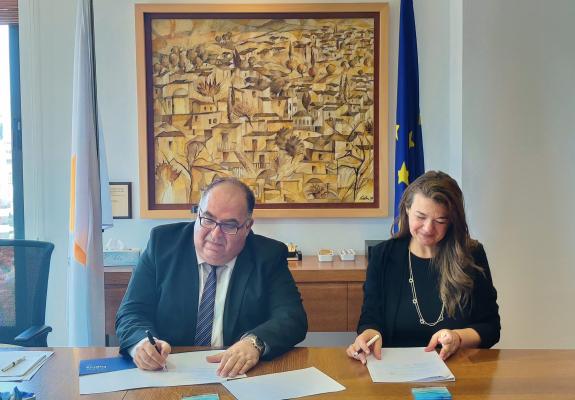Cyprus Faces Major Challenges in Implementing €1.2 Billion Recovery Plan by 2026 Deadline
Only 22% of the €1.2-Billion Envelope Disbursed So Far, Compared to 50% in Other Member States
The implementation of the milestones, reforms, and investments under Cyprus’ €1.2-billion Recovery and Resilience Plan by the 2026 deadline presents a “huge challenge,” European Commission officials stated on Tuesday.
During a discussion with Cypriot journalists, EC officials noted that Cyprus' progress in disbursements from the EU's Recovery and Resilience Facility (RRF) has been "not that good," with only 22% of the €1.2-billion envelope disbursed so far, compared to 50% in other member states.
However, the same official acknowledged that, following contacts with Cypriot authorities and stakeholders, “things are not as bad as they look.” Cyprus has submitted a bundled payment request for the second and third disbursements, as well as an application for the fourth disbursement. The second instalment is expected in November. According to DG Growth at the Finance Ministry, when these disbursements are approved, total payments will reach €500 million, or around 50% of the total financial envelope.
“Even if the situation improves, finalising all investments and reforms by 2026 remains a huge challenge,” the official remarked.
Unlike other EU funds, such as Cohesion Funds, the RRF has an "absolute deadline" of 2026, with no disbursements allowed after this date, as the Commission is borrowing funds from the markets to finance the investments. The RRF was launched as the EU’s response to promote recovery from the Covid-19 pandemic. The last payment request must be submitted by August 2026, leaving time for one more request by the end of the year, two next year, and one in 2026.
Addressing challenges, the official highlighted issues such as the reduction of aggressive tax planning and the delicate matter of green taxation. Aggressive tax planning is one of the 38 milestones included in the second disbursement.
On investments, the official raised concerns about the aquaculture unit in Pentakomo, currently facing legal proceedings. "We are seeing significant opposition, which could jeopardize meeting the deadline," the official warned.
In response to a question, the official stated that the Commission could consider a Cypriot request to use a €100-million loan from the Recovery Plan as an equity investment for the Great Sea Interconnector, a Special Purpose Vehicle created to implement the €1.9 billion electricity interconnector linking Greece and Cyprus. Although no such request has been made yet, the Commission would consider it positively, provided safeguards are in place to ensure the funds are used solely for this purpose.

Cyprus has successfully passed 60% of the legislative milestones required under its Recovery and Resilience Plan, approving 23 out of the 38 necessary laws, according to Anthoula Savvides, Director of the Recovery and Resilience Directorate.
Speaking at the 3rd Annual Event on the Recovery and Resilience Plan in Nicosia, Savvides outlined the progress, noting that out of the 23 laws enacted, two relate to the green transition, six to public administration and local government reform, three to anti-corruption measures, four to the financial and tax sectors, three to investment and licensing facilitation, and three to employment, social welfare, and education reforms.
Regarding the financial implementation of the plan, Savvides reported that approximately 90% of the budget has been activated, with 55%, or €660 million, committed to contracts with contractors or final recipients. She also mentioned that around €280 million has already been paid out, significantly exceeding the amount received from the European Commission.
“This is why the results and actual implementation are not fully reflected by the submission of payment requests and their collection. What we need to ensure is that by the end of 2026, everything will be completed on time,” she emphasized.
Savvides highlighted that, of the plan’s 282 milestones and targets, 68 have been included in payment requests up to the fourth grant disbursement. An additional 34 milestones are completed and will be submitted for the next grant payments, with the fifth disbursement expected by the end of the year and the sixth by mid-2025. The remaining 180 milestones are currently under implementation, with bi-monthly reports submitted to the Cabinet to ensure timely interventions.
In terms of payments, Cyprus has received €263 million so far, with an additional €152 million and €77 million expected from the second, third, and fourth disbursements already submitted. Two of these disbursements have been positively evaluated, with one milestone exception, while the fourth is under review by the European Commission.
Savvides further noted that through the plan, 30,000 households have received support for using renewable energy, including 3,300 vulnerable consumers. Grants were also awarded to 2,600 citizens for electric vehicle purchases, and 70,000 households received assistance to upgrade their connectivity to ultra-high-speed networks.
Additionally, over 1,200 individuals will benefit annually from new, modernised healthcare facilities, with photovoltaic systems installed in schools and residents of Nicosia benefiting from flood protection projects.
Savvides emphasized that all pillars of the plan are progressing satisfactorily. In the public health and civil protection pillar, 32% of the milestones have been completed, while 28% of green transition milestones and 46% related to resilience and competitiveness have been achieved. For the digital transition, 33% of the milestones are complete, and 29% have been met in the employment, education, and social protection pillar.
In the new Repower EU chapter, 13% of the milestones have been implemented, including the establishment of a regulatory framework for energy communities and the launch of several grant schemes.
Savvides also announced that a new amendment to the plan is being developed in collaboration with the European Commission to ensure its successful completion by 2026.






